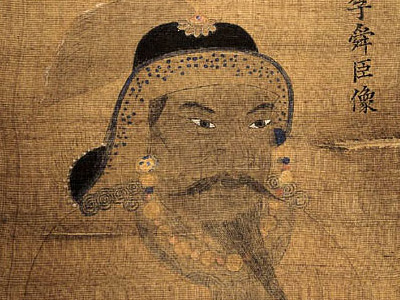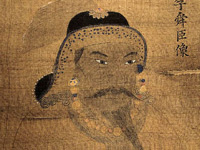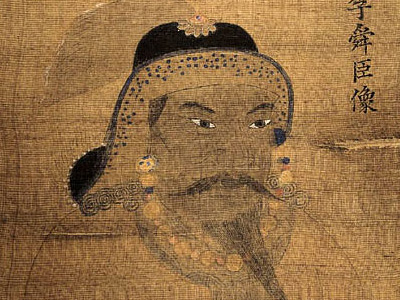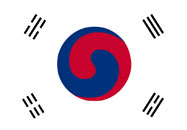Yi Sun-Shin 이순신 (1545-1598)

Legacy
Today, Admiral Yi is considered one of Korea's greatest heroes of all time. Koreans look upon Yi as a man of courage, perseverance, strength, self-sacrifice, intellect, and loyalty to his country.
Admiral George Alexander Ballard of the Royal Navy considered Yi a great naval commander, and compared him to Lord Nelson of England:
"It is always difficult for Englishmen to admit that Nelson ever had an equal in his profession, but if any man is entitled to be so regarded, it should be this great naval commander of Asiatic race who never knew defeat and died in the presence of the enemy; of whose movements a track-chart might be compiled from the wrecks of hundreds of Japanese ships lying with their valiant crews at the bottom of the sea, off the coasts of the Korean peninsula... and it seems, in truth, no exaggeration to assert that from first to last he never made a mistake, for his work was so complete under each variety of circumstances as to defy criticism... His whole career might be summarized by saying that, although he had no lessons from past history to serve as a guide, he waged war on the sea as it should be waged if it is to produce definite results, and ended by making the supreme sacrifice of a defender of his country. (The Influence of the Sea on The Political History of Japan, pg. 66–67.)"
Admiral Togo regarded Admiral Yi as his superior. At a party held in his honor, Togo took exception to a speech comparing him to Lord Nelson and Yi Sun-sin.
"It may be proper to compare me with Nelson, but not with Korea’s Yi Sun-sin, for he has no equal. (The Imjin War, by Samuel Hawley, pg. 490)"
Prior to the 1905 Battle of Tsushima, Lieutenant Commander Kawada Isao recalled in his memoirs that:
"...naturally we could not help but remind ourselves of Korea’s Yi Sun-sin, the world’s first sea commander, whose superlative personality, strategy, invention, commanding ability, intelligence, and courage were all worthy of our admiration. (The Imjin War, by Samuel Hawley, pg. 490)"
Admiral Tetsutaro Sato of the Imperial Japanese Navy mentioned the Korean admiral in his book published in 1908:
"Throughout history there have been few generals accomplished at the tactics of frontal attack, sudden attack, concentration and dilation. Napoleon, who mastered the art of conquering the part with the whole, can be held to have been such a general, and among admirals, two further tactical geniuses may be named: in the East, Yi Sun-sin of Korea, and in the West, Horatio Nelson of England. Undoubtedly, Yi is a supreme naval commander even on the basis of the limited literature of the Seven-Year War, and despite the fact that his bravery and brilliance are not known to the West, since he had the misfortune to be born in Joseon Dynasty. Anyone who can be compared to Yi should be better than Michiel de Ruyter from Netherlands. Nelson is far behind Yi in terms of personal character and integrity. Yi was the inventor of the covered warship known as the turtle ship. He was a truly great commander and a master of the naval tactics of three hundred years ago. (A Military History of the Empire, pg. 399)"
During the time of the invasion, it was up to the admiral to supply his fleet. Yi's fleet was cut off from any helping hand from the king's court and had to fend for itself. The admiral often wrote in his war diary, Nanjung Ilgi War Diary of Admiral Yi Sun-sin, about how concerned he was about the food supply during winters. His enemy was fully supplied, and always outnumbered him.
Yi himself had never been trained as a naval commander. Korea, called Joseon at the time, did not have any naval training facilities. Although Yi passed the military exams when he was young, he was never trained at an academy. Yi's only military experiences came from fighting foreign Jurchen tribes invading from Manchuria. In fact, the Battle of Okpo, his first victory against the Japanese fleet, was also his first sea battle ever. None of his subordinates, including his own staff, had ever fought at sea before.
One reason Admiral Yi was successful in his battles was because his cannon had longer range and power than the enemy's, with the Japanese heavily favoring troop transport over naval combat. His turtle ship, which had first set sail the day before the invasion, was very effective in leading the attack and breaking the enemy's formation. Yi won all of at least twenty-three naval battles fought while suffering very minimal losses, destroying a lot of Japanese ships and killing a lot of Japanese soldiers.
Admiral Yi used many different formations according to the situation, and capitalized on tides and ocean currents. Yi also took advantage of his knowledge of the surrounding sea. Many times, he lured the enemy to a place where his fleet would have the upper hand.

Rear view of the statue of Admiral Yi at Busan Tower, in Busan, South Korea
At the Battle of Hansando, the Japanese commander broke ranks and Yi routed his fleet. Yi's expertise on naval strategy is apparent in the fact that his successor, Won Gyun, even with all of Yi's ships and trained crew, could not defeat an enemy fleet of similar might. One of the greatest legacies of the admiral was the disruption of the Japanese supply line. Through his calculated attacks, he successfully burdened the Japanese navy and the supplies trying to reach their lines near the Chinese border.
Yi's naval reforms did not persist and disappeared soon after his death. The turtle ships faded into the annals of Korean history, reaching iconic legendary status today. The Joseon royal court decided on a reduced military, especially after the Manchu invasions in the 1630s.
Yi kept a careful record of daily events in his diary, and it is from these entries, along with the reports he sent to the throne during the war, that much about him has been learned. Also, much information about the turtle ships are written in his diaries. These works have been published in English as Nanjung Ilgi: War Diary of Admiral Yi Sun-sin, and Imjin Jangcho: Admiral Yi Sun-sin's Memorials to Court.
Among his direct male descendants, more than two hundred passed the military examination and pursued military careers, hence constituting a prominent family or military yangban of late Joseon. Although many of his male descendants did not play the kind of a vital role in the politics of late Joseon, the court seems to have treated them with respect. Many attained important high-level posts in the administration. Moreover, at the end of the Joseon Dynasty, at least several descendants are known to have become anti-Japanese independence activists. Today, most of Yi's descendants live in or near Seoul and Asan.
In Korea, Admiral Yi is not only famous for the turtle ship, but also for his last words before his death. He told his nephew to wear his armor and to hide his death until the battle is over to avoid demoralizing his men in the middle of battle. His last words were, Do not let my death be known (나의 죽음을 알리지 마라).
HISTORY

RESOURCES
This article uses material from the Wikipedia article "Yi Sun-Shin", which is released under the Creative Commons Attribution-Share-Alike License 3.0.
© Stories Preschool. All Rights Reserved.











